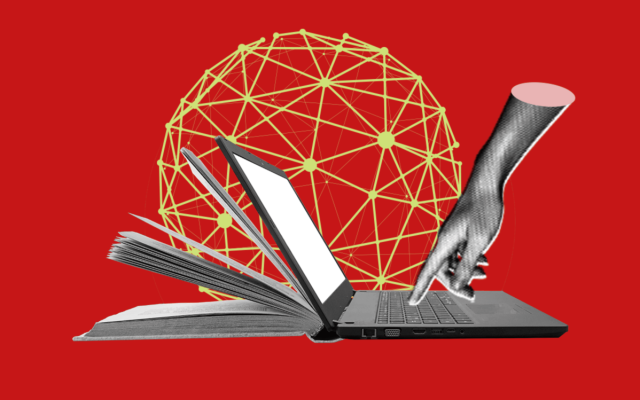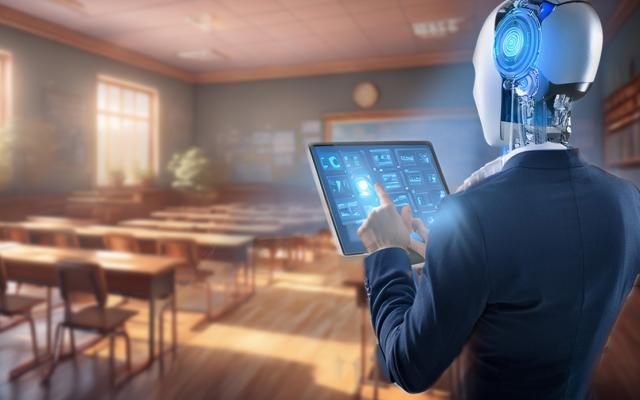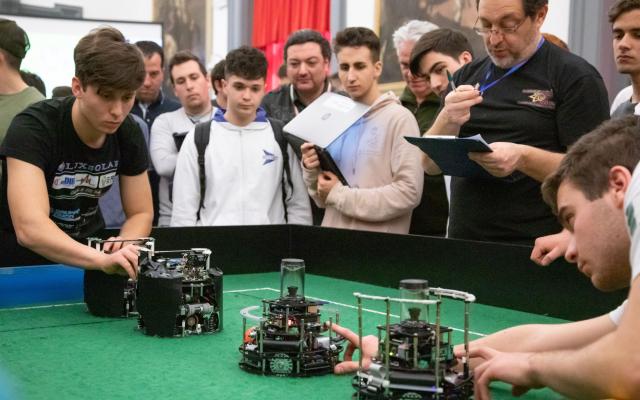The history of RomeCup: from project to development platform.
FMD’s interest in robotics began over twenty years ago to explore innovative solution for learning by students with special needs.
From 2003 to 2005, as the Consorzio Gioventù Digitale, we experimented with robotic technology for students with motor disabilities (Project Auxilia in collaboration with the Scuola Superiore Sant’Anna di Pisa). In 2004, we signed an agreement with the Campus Bio-Medico University and the City of Rome for a service project: Punto Acca. In 2006, thanks to European Project RoboDidactics, we developed the first series of school textbooks (six volumes) with real-time evaluation methodology [see resources: Educational Robotics]. In the same year, we accompanied three Roman schools to the first Festival of Science.
In the two volumes entitled Innovation in Rome’s Schools, we presented the best robotics projects developed by schools.
Then, in 2007, we launched the first edition of RomeCup. Since then the event – RomeCup – Excellence in Robotics in Rome – has become an annual appointment with each new edition presenting important new achievements.
2007. The 1st International City of Rome Robotics Trophy, held in the Campidoglio’s “Sala della Protomoteca” attracted students from around the world to participate in three events: a competition, a showcase area for school projects, and a workshop on robodidactics. The robots, designed and assembled by students, competed in the following categories: explorer, fighter, and football. One of the highlights was the three-way meet between Italy, Portugal, and Spain, won by the Italian team. In parallel with the morning competitions, a seminar was held for teachers on “Robotics in Didactics – Comparing Experiences.” Giammarco Verruggio, President of the School of Robotics, and Daniele Nardi, Professor of Artificial Intelligence at Sapienza University of Rome addressed the state of art of robotics and automation didactics. Moreover, the best experiences developed in Italian schools in Rome, Pisa, Catania, Latina, and Grosseto were presented. The initiative sparked the curiosity of the public and national press.
2008. The 2nd edition organised an international workshop on the European methodology for the development of robotics in schools, as part of the “Robodidactics” Project. In the showcase area, experts from the 17th Stormo Incursori simulated the operation of bomb disposal robots in public order and international peacekeeping operations. [Watch the video].
2009. The 3rd edition introduced the first Roman Robo-Olympics in which humanoid robots engaged in various activities from running to gymnastics. The showcase area exhibited not only the pilot projects developed by schools (anthropomorphic robotic hand, puzzle robot, ecologist robot, etc.), but also a section dedicated to the inclusive applications of biomedical robotics (from the early diagnosis of learning disabilities to the remote limb rehabilitation). The international conference addressed "School and Robotics: An Evolving Combination," comparing the best teaching practices, starting from nursery school. A section of the seminar was dedicated to "Robotic Pills" to provide space to all the new experiences. [Watch the report by AdnKronos].
2010. By the 4th edition, the RomeCup had taken on an increasingly international character. The three-day event included the national selections for Robocup Junior 2010; the winners participated in the 2010 Robotics World Championship in Singapore. The competition categories were Soccer, Dance, Rescue and, for the first time, in the soccer category, “featherweight” robots were also admitted to the national competitions. In parallel, the RoboCup Mediterranean Open 2010, a championship for humanoid robots from all Mediterranean universities, was held. [Watch the video].
2011. The 5th edition expanded the traditional formula of three events in one (competitions, showcase area, and conference) with important innovations: educational workshops for schools (involving over 2000 students in two days), workshops for teachers, and an institutional event for the signing of the first network agreement launching a long-term national strategy for educational robotics. The showcase area focused on educational and service robotics. [Watch the video].

2012. The 6th edition consolidated the relationship between schools and business. In the showcase area, open to students of all ages, workshops were held on educational robotics in collaboration with several top realities, including STMicroelectronics and the Waseada University of Tokyo, the University of Catania (Department of Electrical, Electronic and Systems Engineering), Comau Spa, the Robotics in School Network, the Robotics School of Genoa, and other important partners. New textbooks for primary school were published. [Watch the video].
2013. The 7th edition introduced competitions in the Cospace Theatre category. The first LEIS (Lego Education Innovation Studio) was launched in Rome. Over 30 schools from 12 Italian regions participated in the competitions. Moreover, there were 20 laboratories for students and workshops on innovative teaching for teachers, and 3 large conferences addressed robotics and the future, work, and development. Over 30 top players exhibited in the showcase area. The last day presented the Jobot Matching Day and the meeting between students, companies, and universities. [Watch the video].
2014. The 8th edition featured more locations, labs, competing teams, and prototypes, as well as discussion tables on national emergencies, such as employment. Thanks to 20 interactive laboratories, students of all ages learned robotics and its many applications. For the younger students, Sapienza University students organized a penalty shoot-out with a Nao goalkeeper. Over 100 teams from 13 Italian regions competed for the Robotics World Championship in Brazil. The finals and the awards ceremony were held in the prestigious setting of the Campidoglio, in the Protomoteca Hall. The absolute protagonist was the Multi-sector Educational Robotics Network that participated at all the discussion tables with institutions, schools, companies, universities, research centres, etc. The first Roman Fab Lab, built according to the indications of the MIT's Center for Bits and Atoms, was inaugurated. An Italian team was World Champion in Brazil in the Soccer category. [Watch the video].
2015. The 9th edition introduced students from all over Italy to 8 success stories of under-30s who were able to transform robotic solutions into innovative start-ups. The goal was to demonstrate that robotics could also be abusiness and that it was an important pillar for building a youth accelerator to exit the crisis timely. Schools presented more than 60 prototypes developed by very young students, almost all under 18, and also PCTO experiences based on drones and robots. The competitions attracted 109 teams from schools in eleven regions for a total of almost 400 students. The Brazil World Champions also participated and were once again selected for RoboCup in China, winning the world title for two consecutive years. RomeCup also participated in the European “Get Online Week 2015” and “Grand Coalition for Digital Jobs” campaigns. Rai Cultura was the event media partner. [Watch the video].
2016. In the 10th edition, the event "doubled" by also hosting the first edition of the Robotics Olympics. Italian schools participated with 156 competing teams and 56 Olympic champions. The focus was on technology by women with the brilliant young women studying robotics, as part of the Month of STEM, and on research and safety, from virtual reality to drones. At the RomeCup, the Fondazione Mondo Digitale also relaunched the European “eSkills for Jobs 2016” and “Get Online Week 2016” campaigns. In the showcase area, at the Palalevante del Croce-Aleramo, 200 prototypes were exhibited, including 56 "robotic champions" selected for the Robotics Olympics and promoted by MIUR with the Fondazione Mondo Digitale. The winners received awards in Parma on May 24th as part of the Maifest, the opening night of the SPS IPC Drives Italia Fair. [Watch the video].
2017. The undisputed protagonists of the 11th edition were cobots, collaborative robots that help us to study, work alongside humans, replacing them in the most repetitive tasks, and provide support for hospital and home care. The edition was hosted from March 15-17 March by the Engineering Macro-area of the University of Tor Vergata. Then, as always, on the third day, the finals and awards ceremony were held at the Rome Campidoglio. The competitions featured 142 teams from schools in 16 Italian regions and 2 European countries, with selections for the Robotics World Championship in Japan (RoboCup 2017). In the showcase area, alongside more than 50 prototypes from research centres, start-ups, spin-offs, and companies, there also were over 80 robots designed in school laboratories, preparing young people for the new challenges of the digital economy and helping them to explore new professions. Schools were the protagonists with 142 competing teams and 80 prototypes in the showcase area. This edition also introduced interactive talks with innovative start-ups, spin-offs, companies, and research centres, as well as musical performances and out-of-competition challenge between domestic robots. Italian teams won the World Championship in Japan in the Soccer and On stage categories. [Watch the video].
2018. "Robotics and Life Sciences in the Innovation Ecosystem" was the focus of the 12th edition. The conference featured a lectio magistralis by Oussama Khatib, Robert Riener, and Nitish V. Thakor, three of the world's leading robotics experts. There also were laboratories, a showcase area with over 130 prototypes developed by schools, and robotics competitions, with selection of the Italian teams participating in the Robotics World Championship in Canada. The event was hosted by the Campus Bio-Medico University of Rome. New formats were tested, including creative contests involving university students and teams of high school students on PCTO programmes, interactive orientation talks and Mux, an original artistic research activity blending artificial intelligence and natural creativity. For the first time, thanks to the contribution of the Roman university, RomeCup proposed a focus on life sciences, robotics and innovation, involving the bioscience production chain, one of the sectors of excellence of the Lazio economy. [Watch the video].
2019. The 13th edition featured over 25 national and international speakers, 148 student teams competing for the Italian Robotics Championship, 6 creative contests, 2 hackathons, and 40 stands in the showcase area dedicated to research centres, companies, universities, and schools. The focus on "Humanity at the Crossroads" brought participants closer to the challenges of augmented and more inclusive humanity. Speakers included Paolo Dario from the Scuola Superiore S. Anna in Pisa and Michelle Jillian Johnson from the University of Pennsylvania. Paralympic champions Martina Caironi and Monica Contraffatto participated in the talk on "Human Enhancement" to present how new technology can improve the condition of patients with dysfunctions and/or disabilities and increase human capabilities. Maria Chiara Carrozza, Scientific Director of the Don Gnocchi Foundation, introduced the session dedicated to women in robotics, while Bruno Siciliano from the “Federico II” University of Naples addressed the opportunities of industry 4.0 for young people. [Watch the video].
2020. During the pandemic lockdown, the annual event was cancelled, but the story continues on mondodigitale.org.
2021. Once again during the pandemic, the 14th edition had a fictional location, integrating domestic spaces, physical competition fields, and virtual classrooms in which to meet classmates and peers thousands of kilometres away. RomecuPlay in Dual Event was organised like a real television palimpsest to follow individually at your preferred time or in class mode, interacting with classmates, coaches, and experts. The competitions were held in collaboration with the RoboCup Jr. Academy to select teams for the "worldwide" version of the Robotics World Championship. An Italian team was world champion in the soccer category.
2022. For the 15th edition, RomeCup returned to the on-site format and was hosted by the Campus Bio-Medico University of Rome to explore the Human-Robot Interaction, delve into the applications of artificial intelligence, and discover the new professions of medicine and biomedical engineering that address the challenge of consilience, the convergence of different disciplines. At the Robotics World Championship in Thailand, the Galileo Galilei SPQR team won the Soccer Light Weight category, achieving its fourth world title. [Watch the video].
2023. The 16th edition, which focused on “Advancing Technology for Humanity - Artificial Intelligence and Human Intelligence. Crucial Challenges for a Better World,” attracted over 3000 participants, 120 teams competing for the International City of Rome Robotics Trophy and RoboCup Junior 2023 selections, 10 teams in the contests with universities for prototyping robots and creating software interfaces, 25 organizations in the showcase are with innovative prototypes developed by schools, companies, start-ups, universities, and research centres. Participants also included international speakers such as Hermano Igo Krebs, one of the pioneers in the field of rehabilitation robotics at MIT (Massachusettes Institute of Technology). This edition also introduced the “Most Promising Researcher in Robotics and Artificial Intelligence” Award in collaboration with the Campus Bio-Medico University of [Watch the video].
2024. The 17th edition dedicated to “Artificial Intelligence and Robotics for the Challenge of Holistic Sustainability” was organised with the Tor Vergata University of Rome, Italian Tech. and the Gedi Publishing Group, and sponsored by the City of Rome, Regione Lazio, Unindustria, and the Italian Association of Robotics and Automation (SIRI). It featured the second edition of the “Most Promising Researcher in Robotics and Artificial Intelligence” Award, in collaboration with the Campus Bio-Medico University of Rome and the Gedi Group [Watch the video].
Come and join us for the 18th edition on May 7-9, 2025, at the University of Roma Tre and at the Rome Campidoglio. This year’s focus will be "What's Next? Human and Artificial Intelligence. The Challenges for Holistic Wellbeing.”.



